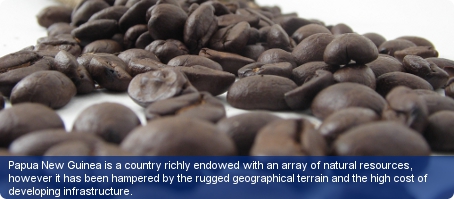Find a business in Papua New Guinea

The state of Papua New Guinea is rich in mineral, agricultural, forestry and fisheries resources, but rugged geographical terrain and the high cost of developing infrastructure has hampered development. Volatile global prices for agricultural and mineral exports have affected development. Papua New Guinea has a GNI per capita of US$1,790 (2012) and has seen GDP growth of 7.4% per annum (2008-12). The industry and agriculture sectors contribute 45% and 32% of GDP, respectively, and the large reserves of oil and gas that the country has have made significant contributions to GDP since 1992. The Investment Promotion Authority of Papua New Guinea maintains that the most lucrative investment opportunities in the sector are in coffee, oil palm, cocoa, coconut, copra and spice crops.
Papua New Guinea has extensive mineral and hydrocarbon resources. Mineral deposits account for almost 65% of all export earnings; the highest contributors in terms of value include oil, copper, and gold, though silver and nickel are also being exploited. Papua New Guinea has 88 million barrels of proven oil reserves and 226.5 billion cubic metres of proven natural gas reserves (January 2011 estimate). The Department of Petroleum and Energy is looking to establish a gas pipeline project in order to protect the depletion of oil resources and to provide an alternative energy source. There are currently various initiatives from Australian energy providers to supply Australia with gas from Papua New Guinea.
Almost 85% of the population relies on agriculture to provide a subsistence livelihood.
Construction accounts for almost 9% of Papua New Guinea’s GDP (2007). The government is taking the lead on stimulating construction in the country, with a particular emphasis on industrial development to establish a number of industrial estates offering tenants serviced land and the opportunity to rent industrial buildings for manufacturing purposes.
The government is faced with many challenges. Amongst these are: regaining investor confidence; restoring integrity to state institutions; promoting economic efficiency by means of privatisation; and balancing relations with Australia. Other socio-cultural challenges facing the country are serious law and order problems and very sensitive land tenure issues. Australia annually supplies $240 million in aid, which accounts for nearly 20% of the national budget.
Papua New Guinea’s rugged, mountainous terrain makes road construction challenging, and though the total national road network is over 19,00km, less than 4% is paved. The country is heavily reliant on shipping and water transport. One primary international airport is Port Moresby at Jackson Field. The other two airports that function as international gateways are Lae and Mount Hagen.
Papua New Guinea is ranked 101st out of 183 for the ease of doing business, according to the World Bank’s ‘Doing Business 2012’ study. But it is ranked fifth best in the East Asia and Pacific region for getting electricity and seventh best for protecting investors. These rankings measure the conduciveness of a regulatory regime in starting and operating a business.
Papua New Guinea has an adult literacy rate of about 62.9% (2012) and English is the official language (2007). Most individuals use subsistence farming as the primary means of supporting themselves and their families, and thus only about 10% of the total labour force is in paid employment.





